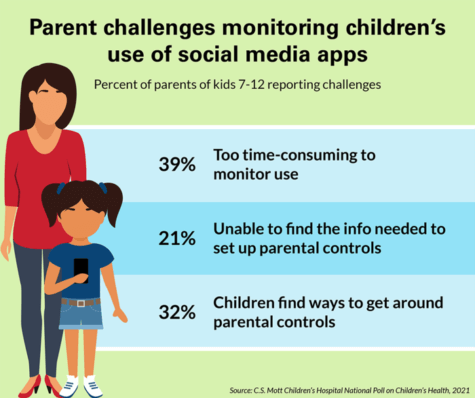ANN ARBOR, Mich. — Social media can be a very distressing place, even for a grown adult. With that in mind, a new study finds a third of children between seven and nine years-old are already using social media apps. However, a team at the University of Michigan says many of these young children are browsing social media without parental supervision.
The national poll finds two-thirds of parents are concerned about their children sharing private information through apps. Despite this, one in six parents with children on social media don’t use parental controls, while two in five say it’s “too time consuming” to monitor their kids’ internet use.
While teenagers making TikTok videos, communicating through Snapchat, or growing their own Instagram accounts has become common in the modern digital era, younger children are also becoming more familiar with these social platforms.
Half of 10 to 12-year-olds and a third of those between seven and nine now use digital devices to engage with others on social media, according to the University of Michigan Health C.S. Mott Children’s Hospital National Poll on Children’s Health.

“There continues to be debate over how soon is too soon when it comes to using social apps and how parents should oversee it,” says Mott Poll co-director Sarah Clark in a university release. “Our poll looks at how often tweens and younger children use social platforms and how closely parents are monitoring these interactions.”
Too much work to monitor social media?
The nationally representative report surveyed 1,030 parents with at least one child between age seven and 12. Parents cited several challenges in overseeing their kids’ social media use with one in five saying they couldn’t find the information they needed to set up parental controls.
Another two in five respondents claimed it’s “too time-consuming” to monitor their youngster’s social media usage. Just over a third believe parental controls are a waste of time because they think their kids would find a loophole around them. Clark says parents should be helping their children navigate the social media world to help them understand the harms of oversharing and interacting with strangers.
“If parents are allowing younger children to engage in social media, they should take responsibility for making the child’s online environment as safe as possible,” Clark adds. “If parents can’t commit to taking an active role in their child’s social media use, they should have their child wait to use these apps.”
In deciding which apps are appropriate and safe for their child, nearly three in four parents say they weigh whether the app has parental controls available to them. More than three in five look at an app’s age rating or if their child needs that app for school.
How are parents keeping the internet safe?
Most respondents are currently using at least one parent control feature, with nearly two-thirds using a parental block on certain sites and three in five requiring parent approval for new contacts. More than half of moms and dads also make use of privacy settings, daily time limits, and passcodes for certain content.
A third of parents say their child learned about safe use of social media apps in school. These parents are also more likely to say their child uses social media apps. Despite letting their young children use social media, one of the biggest concerns parents have revolves around their child’s online privacy, their exposure to inappropriate content, and the possibility of encountering adult predators.
Although two-thirds of respondents worry about their child sharing private information through apps, only 56 percent say they use privacy settings that limit the collection of data through children’s apps. Half the poll also believes their child would be unable to spot an adult user on social media.
“It may be difficult to recognize an adult masquerading as a kid on social media so parents need to take a gatekeeping role for younger kids,” Clark explains.
Other parents worry that their children might encounter adult images or other content that isn’t age appropriate. Clark recommends that parents research apps they’re considering allowing their child to use, including platforms that cater to kids. This may include modified versions of apps popular with teens, such as Facebook’s Messenger Kids or TikTok’s “younger user” section.
Combating the influence of misinformation
Other apps, designed specifically for pre-teens, try to limit the online risks by restricting certain activities – such as posting photos or using private chats – and offering dashboards or reports for parents to monitor their child’s use of the app.
“Parents should look into whether the content is curated to allow only youth-friendly programming or whether there is a moderator that weeds out inappropriate content,” the poll director continues. “They should also utilize parental blocks or passcodes for certain sites or content.”
One in three parents aren’t confident that their child could recognize what information is true or false on social media apps. Clark recommends parents talk to their kids about identifying credible sources and encourage children to rely on sites or information sources that their school or educational apps recommend.
Study authors warn that helping children recognize altered images and videos may be more challenging. Clark says parents should have ongoing conversations with young children about what they read and see on social apps and help them recognize disinformation and altered images as such content may lead to distorted perceptions of body image or encourage dangerous actions.
“Parents should be guiding children toward safe use of social media apps through both parental controls and having regular conversations with their kids to teach them online safety rules,” Clark concludes. “For young kids who are using these apps for the first time, it’s especially important for their parents to stay vigilant about content they’re engaging with and who they’re talking to. Parents should also be transparent that they plan to monitor their child’s profiles, posts and interactions on social media until they’re older.”
South West News Service writer Stephen Beech contributed to this report.
